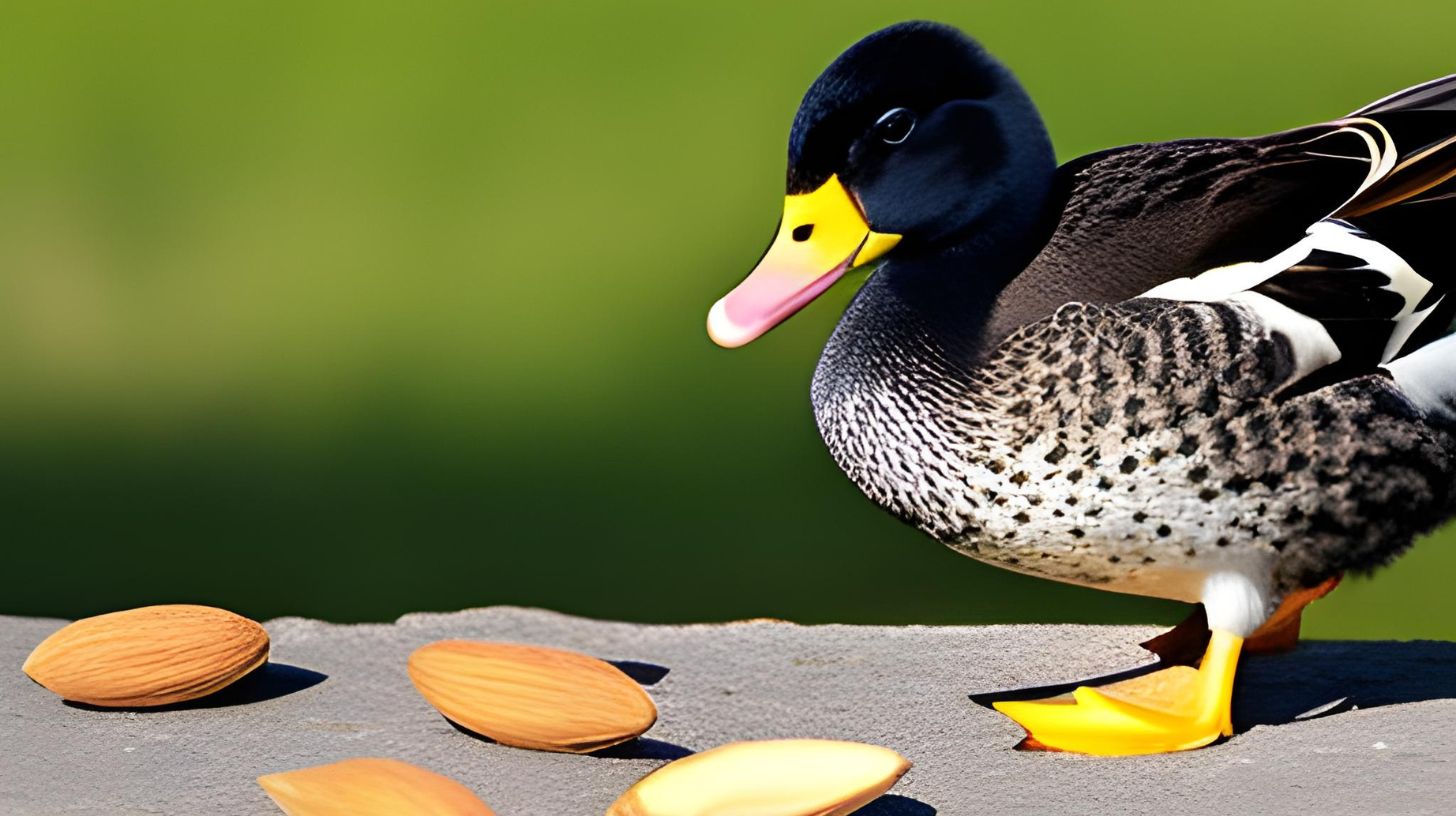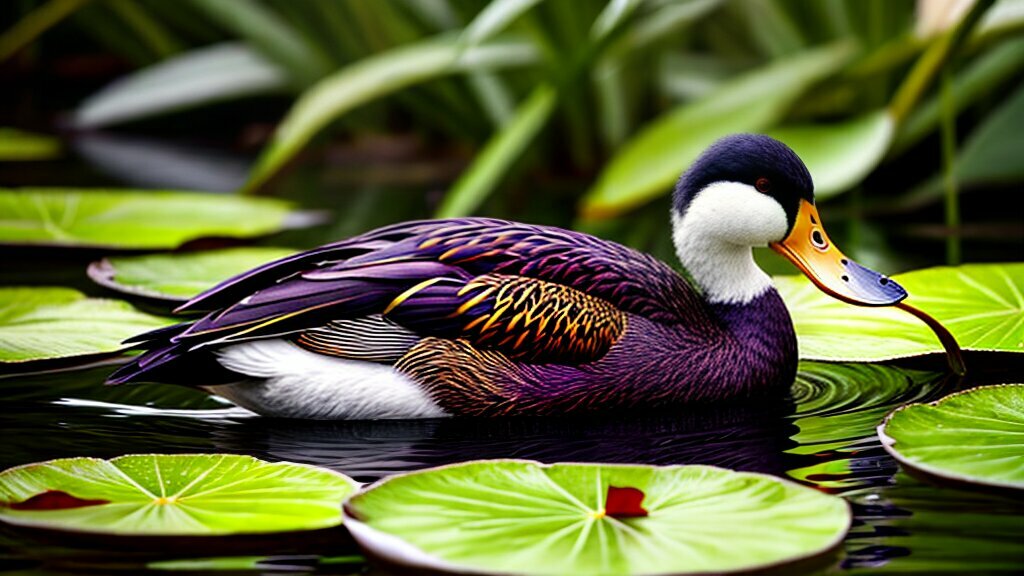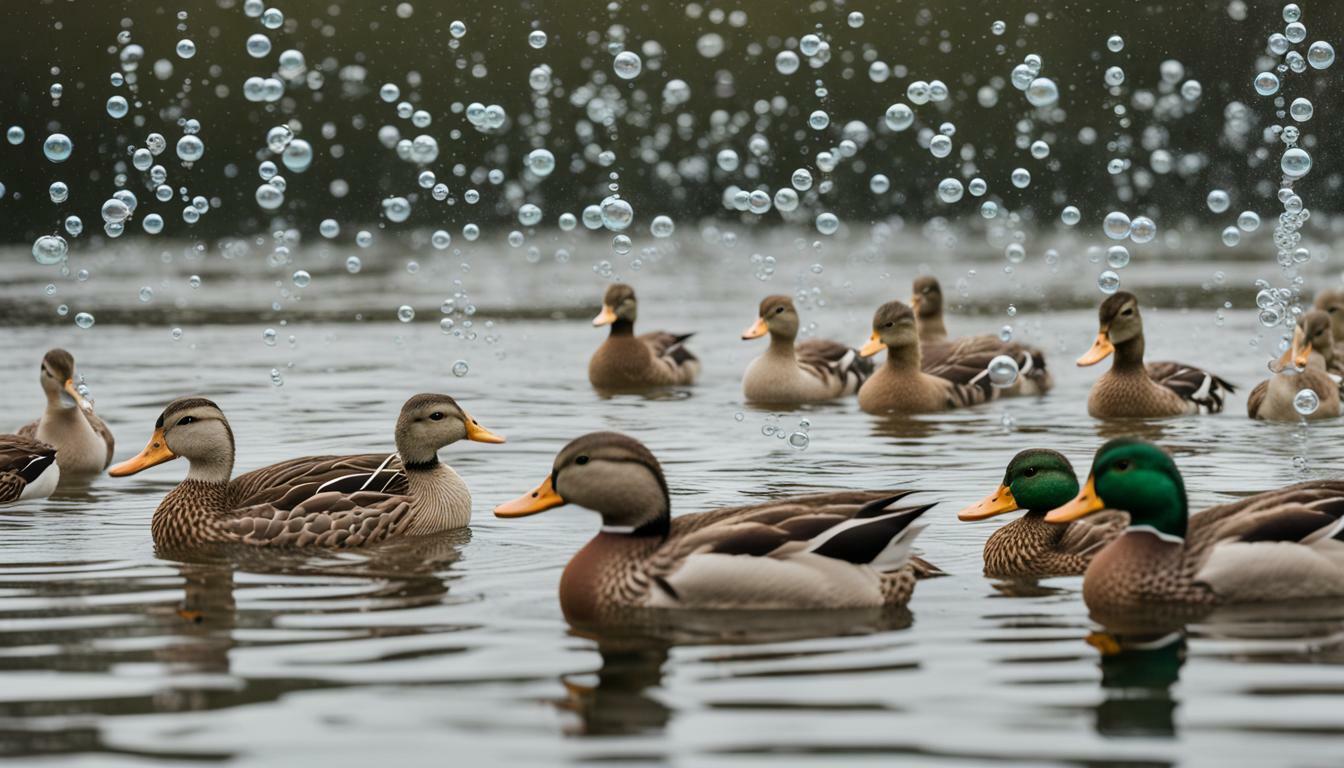Can Ducks Eat Potatoes? Benefits, Risks, and Tips
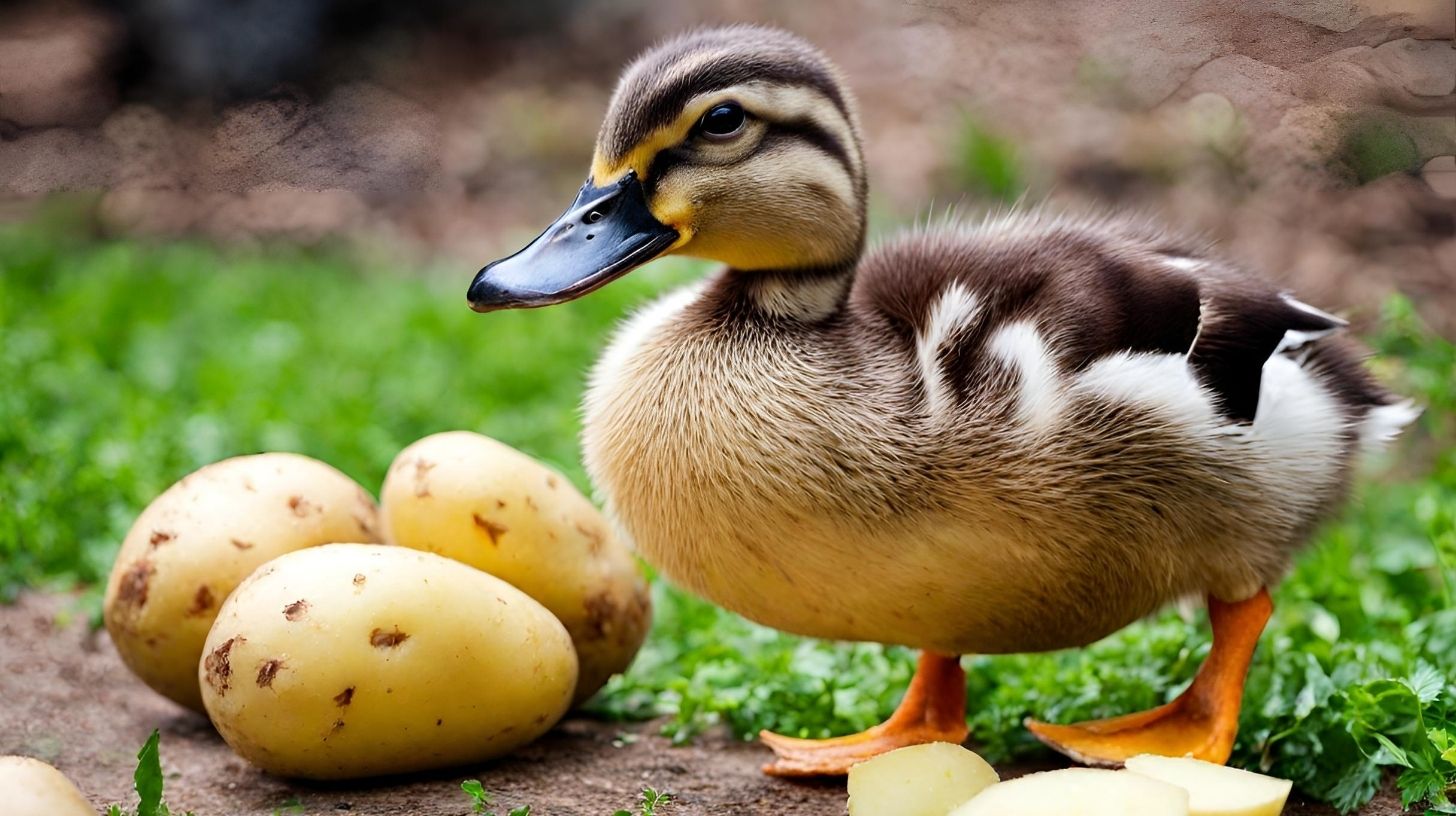
Table of content:
- Can Ducks Eat Raw Potatoes?
- Health Benefits of Potatoes for Ducks
- Are Potatoes Safe for Ducks?
- How Much Potato Can Ducks Eat?
- Do Wild Ducks Eat Potatoes?
- Can Ducks Eat Sweet Potatoes?
- Can Ducks Eat Baked Potatoes?
- Can Ducks Eat Mashed Potatoes?
- Can Ducks Eat French Fries?
- Frequently Asked Questions
- Conclusion
Can ducks eat potatoes? The short answer is yes, ducks can safely eat potatoes in moderation when cooked, mashed, or baked. However, there are some risks to be aware of and preparation methods to follow.
Key Takeaways:
- Ducks can eat potatoes, but preparation is important. Cook, mash, or bake potatoes to break down tough cell walls.
- Feed potatoes in moderation, no more than 15% of daily diet. Too much raw potato can cause digestive upset.
- Avoid green potatoes, sprouts, skins, and eyes which contain higher glycoalkaloid levels.
- Cooked potatoes provide beneficial nutrients like vitamin C, B6, fiber, potassium.
Potatoes are a starchy, high-carb vegetable that can be a nutritious part of a duck’s balanced diet when fed properly. Both domestic and wild ducks enjoy the taste of potatoes. However, there are some risks with certain parts of potatoes and preparation methods.
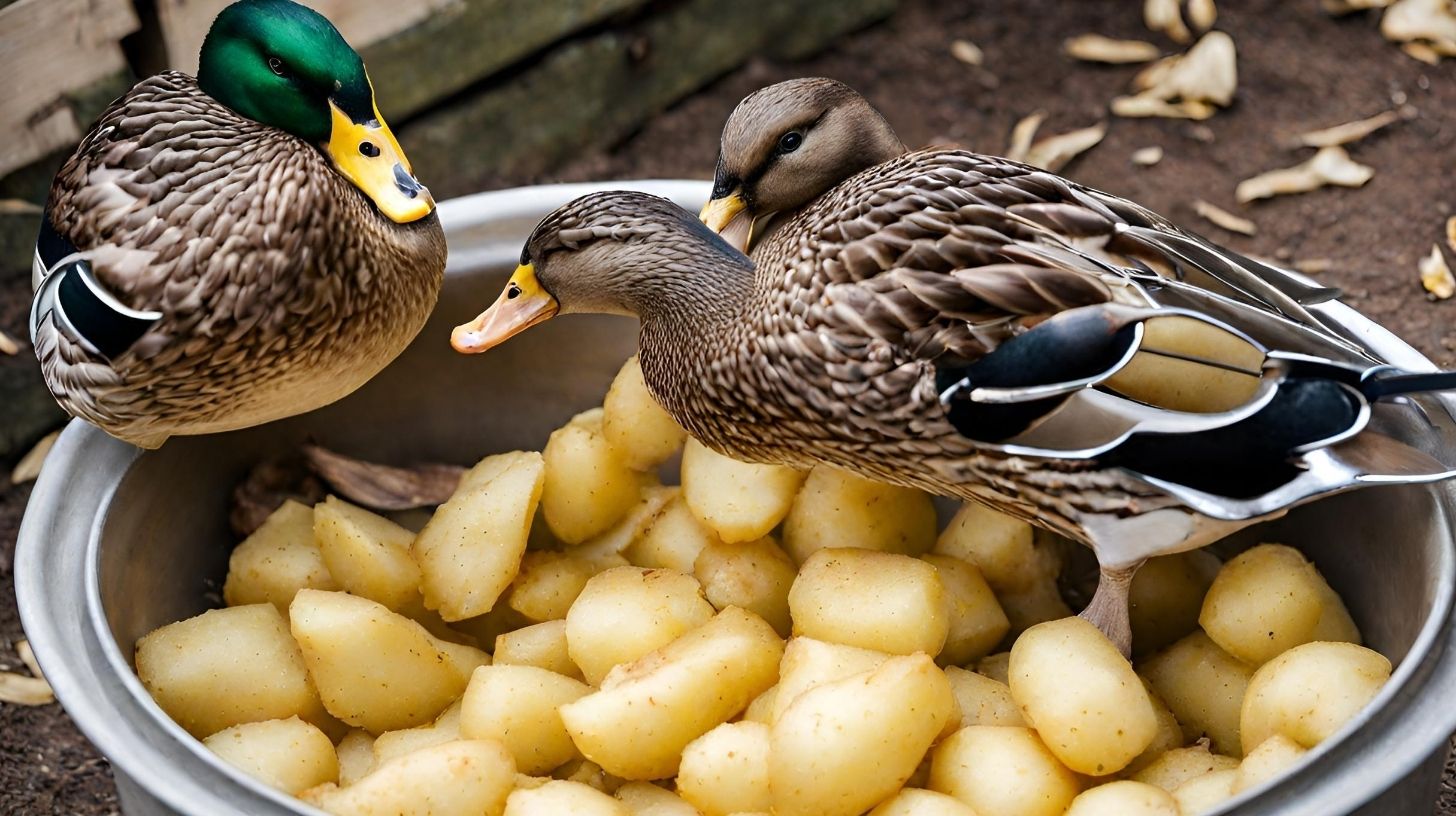 Can Ducks Eat Raw Potatoes?
Can Ducks Eat Raw Potatoes?
Raw potatoes are not recommended for ducks. Raw potato contains compounds called glycoalkaloids, mainly solanine and chaconine. Glycoalkaloids act as a natural pesticide for the potato plant, protecting it from insects and disease. These compounds are concentrated more heavily in the skin, sprouts, and eyes of potatoes.
Cooking breaks down these glycoalkaloids, making potatoes safer to eat. For ducks, it’s best to avoid feeding raw potatoes entirely. The tough cell walls are also hard to digest.
Safe Potato Preparation for Ducks
- Bake, boil, or microwave whole potatoes until soft
- Mash or rice cooked potatoes
- Cut cooked potatoes into small pieces
- Avoid potato skins and green areas
Health Benefits of Potatoes for Ducks
When prepared properly, potatoes can be a healthy addition to a duck’s diet in moderation. Here are some of the key nutrients found in cooked potatoes:
Potato Nutrients
- Vitamin C: Immune supporting antioxidant
- Vitamin B6: Helps body metabolize food
- Potassium: Important for muscle function
- Fiber: Promotes healthy digestion
- Carbohydrates: Provides energy
The high fiber and carbohydrate content make potatoes a good source of energy. The vitamins and minerals offer nutritional benefits as well.
Potatoes offer the most nutrients when the flesh is eaten, not the peel. Make sure to thoroughly cook potatoes and discard any sprouts or green areas before feeding to ducks.
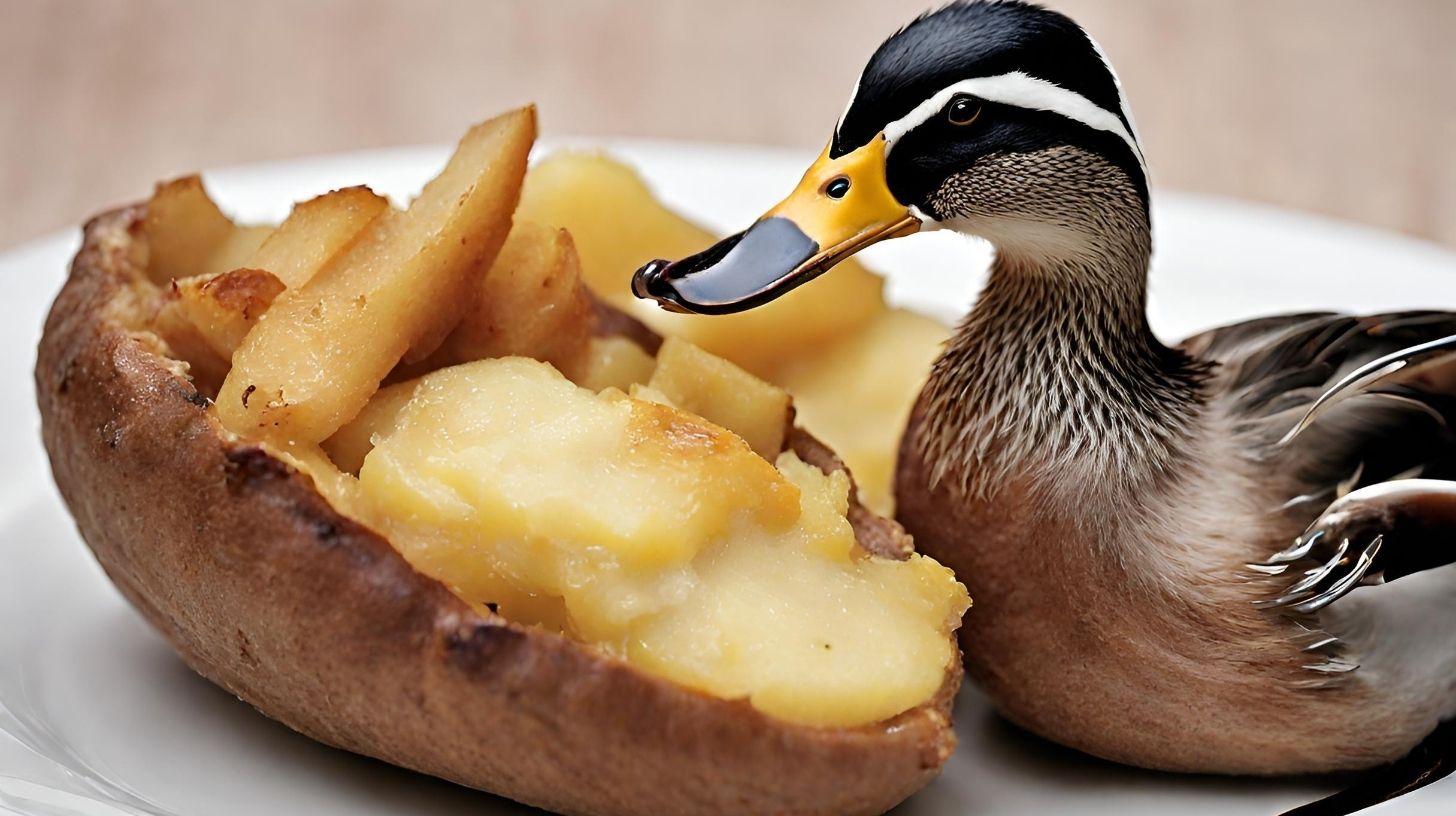 Are Potatoes Safe for Ducks?
Are Potatoes Safe for Ducks?
Yes, potatoes can be a safe food for ducks when prepare properly. The main safety issues to avoid are:
- Glycoalkaloids in Raw Potatoes: Cooking reduces these toxic compounds
- Choking Hazards: Ducks gulp food, so cut cooked potatoes into small pieces
- Imbalanced Diet: Potatoes should comprise only a moderate part of diet
As long as you avoid feeding raw potato and skins, cook the potatoes fully, and chop into bite-size pieces, potatoes can be a safe addition to a duck’s diet. Feed potato in moderation along with other foods like grains, produce, and protein sources.
How Much Potato Can Ducks Eat?
It’s best to limit potatoes to around 10-15% of a duck’s daily food intake. Feeding too many potatoes could lead to an imbalanced diet. Here are some tips on amounts when adding potatoes to a duck’s diet:
- Whole Potatoes: No more than 1 medium baked potato per duck per day
- Mashed Potatoes: Around 1⁄4 to 1⁄2 cup daily
- Chopped Potatoes: 1-2 tablespoons maximum per feeding
When mixing chopped or mashed potato with other foods like chicken feed or greens, aim for potatoes to make up 15% or less of the total volume.
Monitor the duck’s droppings when feeding potatoes. Runny droppings could mean too much potato is being fed. Adjust amounts downward if needed.
Do Wild Ducks Eat Potatoes?
Wild ducks will eat potatoes on occasion if they have access to gardens or farm fields. However, potatoes make up a very small part of a wild duck’s natural diet.
The bulk of a wild duck’s diet consists of:
- Aquatic plants
- Algae
- Grass
- Seeds
- Aquatic insects
Wild ducks have diverse foraging habits suited to their environment. They may sample potatoes but rely on many other sources of nutrition.
Can Ducks Eat Sweet Potatoes?
Yes, ducks can safely eat sweet potatoes. Cook sweet potatoes thoroughly before feeding to ducks to improve digestibility.
Sweet potatoes provide benefits including:
- Vitamin A – Strong antioxidant supports immune system
- Vitamin C – Boosts collagen production
- Potassium – Helps nervous system function
The glycoalkaloid content is lower in sweet potatoes compared to white potatoes. But still cook the sweet potatoes before feeding to ducks.
Can Ducks Eat Baked Potatoes?
Baked potatoes are a great way to prepare potatoes for ducks. Whole baked or microwaved potatoes have a soft texture and thoroughly cooked flesh that ducks can digest easily.
Here are some tips when feeding baked potatoes to ducks:
- Bake large potatoes until fork tender all the way through
- Let potatoes cool before feeding
- Chop into bite-size pieces or mash
- Avoid feeding potato skins
Loading baked potatoes with butter, cheese, bacon and other toppings is not necessary and may cause diarrhea. Plain baked potato is healthiest for ducks.
Can Ducks Eat Mashed Potatoes?
Mashed potatoes are another good potato option for ducks. The potatoes are fully cooked and then mashed into a soft consistency. Avoid adding milk, butter or other seasonings meant for human consumption.
To mash potatoes to feed ducks:
- Bake or boil potatoes until very tender
- Drain and let potatoes cool
- Mash the potatoes well, without add-ins
- Mix with other duck foods or offer plainly
The soft texture of mashed potatoes is easier for ducks to digest than whole chunks. Limit mashed potato to around 1⁄4 to 1⁄2 cup per duck per day.
Can Ducks Eat French Fries?
It’s best to avoid feeding ducks french fries or other fried potato products. French fries are cooked at high temperatures which can create harmful compounds like acrylamide.
Additionally, frying adds a lot of fat. The seasoning on french fries contains excess sodium and spices that are unhealthy for ducks.
If you want to share a rare french fry treat, offer just a bite or two maximum per duck.
Frequently Asked Questions
Are potato peels safe for ducks?
No, potato peels are not recommended. The skin and just under the peel is where glycoalkaloids concentrate most densely. Feeding the peeled flesh is safer.
Can baby ducks eat mashed potatoes?
Yes, mashed potatoes are fine for baby ducklings over 2-3 weeks old as an occasional treat in small amounts. Avoid raw potato for ducklings.
Do ducks like sweet potatoes?
Most ducks enjoy the taste of cooked sweet potato. The natural sugars make it palatable. Just cook the sweet potato thoroughly before feeding.
Can I feed ducks leftover baked potatoes?
Yes, leftover baked potato is fine for ducks if it hasn’t been sitting out for more than 2 hours. Chop into pieces and mix into their feed. Avoid any seasonings or toppings.
How do you prepare potatoes for ducks?
The safest ways to prepare potatoes for ducks include boiling, baking, microwaving whole potatoes, or mashing thoroughly cooked potatoes. Chop cooked potatoes into bite-size pieces before feeding.
Conclusion
In conclusion, potatoes can be a healthy part of a balanced diet for domestic and wild ducks when prepared properly. By cooking potatoes thoroughly, removing peels and any green areas, chopping into bite-size pieces, and feeding in moderation mixed with other foods, potatoes can provide beneficial nutrition without posing a toxicity risk to ducks. Following these simple preparation tips allows potato to be a safe, nutritious supplemental food ducks enjoy.
Welcome. I’m Adreena Shanum, the proud owner of this website, and I am incredibly passionate about animals, especially poultry. I founded adreenapets.com as a labor of love, stemming from my desire to share my knowledge and experiences with poultry enthusiasts worldwide.


